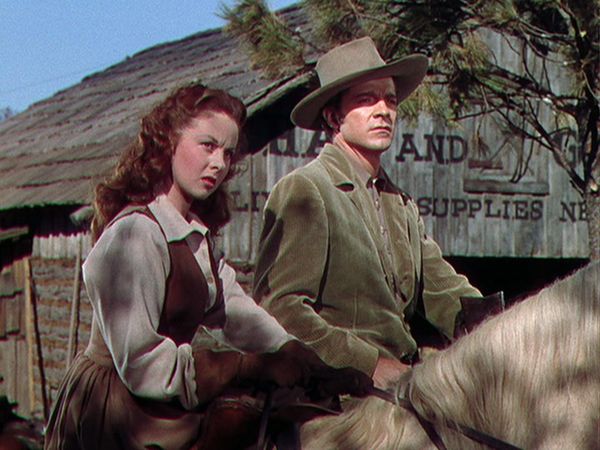
Dir: Jacques Tourneur | 92′ | Western Drama | Susan Haywood, Dana Andrews, Brian Donlevy, Patricia Roc | US
CANYON PASSAGE (1946) is another underrated Tourneur masterpiece that fell from favour for not falling in with the standards of the genre: it is not a Western with a central revenge story nor a roadie or outlaw narrative, and the hero (or cavalry) does not save the town from attacking marauders. CANYON PASSAGE is a story about the community, the nuts and bolts that make the town work. It is a document of values, conflicts, defects and — in the end – a re-affirmation of the way people lived in the newly conquered West.
Tourneur was only confirmed as the director in July of 1945, a month before shooting began in and around Diamond Lake and Medford, Oregon. Before his appointment, Robert Siodmak, Stuart Heisler and George Marshall were all attached to the project. Set in 1856, the central character Logan (Tourneur regular, Dana Andrews ), runs a mule freight line and a general store in the small mining town of Jacksonville. Ernest Pascal’s script (based on the novel by Ernest Haycox), describes his relationship with his friends: George Camrose (Brian Donlevy), a banker, who steals gold from his customers to cover his gambling debts. George’s fiancée Lucy Overmite (Susan Hayward), is secretly in love with Logan; while Caroline Marsh (Patricia Roc) gets engaged to him during a cabin rising. Finally, there is the violent Honey Bragg (Ward Bond), a loner whom Logan suspects of various unsolved crimes. To cover his embezzlements, Camrose kills a miner. He is caught and sentenced to death by a kangaroo court. Logan helps him to escape when an Indian uprising causes confusion. George and Bragg are killed, while Caroline gives up Logan, whom she calls ‘restless’. Logan rides off with Caroline to San Francisco.
The way the film resolves conflicts seems rather modern, anticipating certain films by Sam Peckinpah (who would be Tourneur’s assistant on Wichita) and Robert Altman. The denouements are not without regret: Logan speaking George’s epitaph: “There is a fine margin between what could have been and what is…In some other kind of country he might have made the grade.” The peaceful Hi Linnet (Hoagy Carmichael) is a very modern bard who could easily make an appearance in a 1960s retro Western.
DoP Edward Cronjager excels is the poetic night scene where Linnet’s role in the developing patterns of the film are shown in all their complexity. Tourneur uses texture, movement, and his signature light and shadow in same way as in his black-and-white films. The exteriors call to mind Days of Glory, Out of the Past and Berlin Express; their towering heights dwarfing the characters. For example, the shoot-out between Logan and Bragg in the forest, uses the height of the trees to show nature’s indifference to human conflict. Finally, Logan is a true Tourneur hero: his journey has no destination: it is purely motion. And in this way, Logan resembles the later Tourneur heroes, particularly Jeff Bailey in the director’s next film, Out of the Past.
JACQUES TOURNEUR RETRO | LOCARNO FILM FESTIVAL 2017 | 2-12 AUGUST 2017